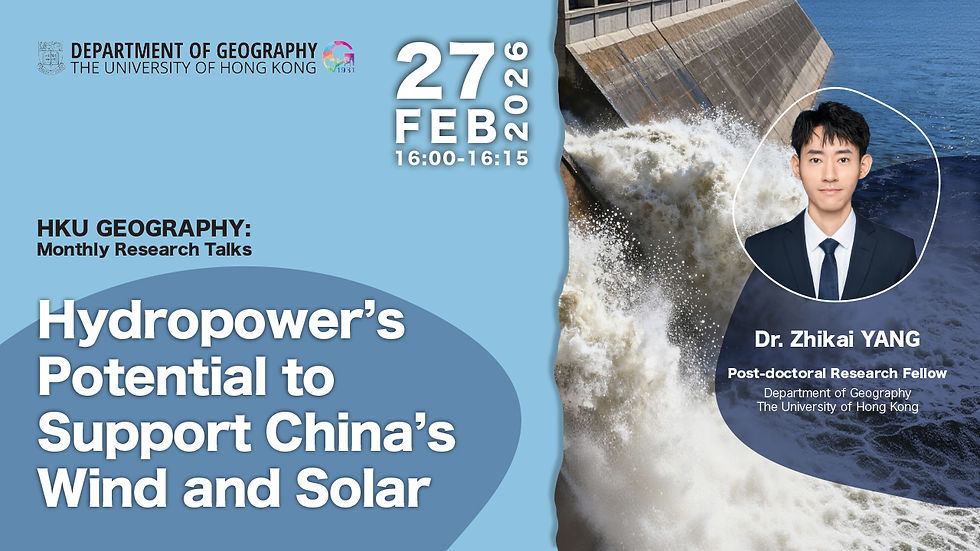13 OCT 2025 (MON) 15:00-17:00
- Oct 13, 2025
- 2 min read
Geography Distinguished Seminars Series
CO₂ Fertilization Effects on Global Greening and Net Primary Productivity
Date: 13 OCT 2025 (Monday)
Time: 15:00-17:00 (HKT)
Venue: CLL, Department of Geography, 10/F, The Jockey Club Tower, Centennial Campus, HKU
Mode: Hybrid
Via Zoom: Zoom link will be provided upon successful registration
Registration link: https://hkuems1.hku.hk/hkuems/ec_hdetail.aspx?guest=Y&ueid=103109
Abstract:
Global lands have experienced significant greening in recent decades, often attributed to enhanced photosynthesis under elevated atmospheric CO₂ (eCO₂). Yet the extent to which eCO₂ drives increases in net primary productivity (NPP) remains uncertain. Process-based ecosystem models have long been used to simulate these effects, but their estimates vary widely due to differing representations of plant responses. Here we present an observation-based alternative: an empirical model derived from CO₂ enrichment experiments that links increases in maximum leaf area index (LAI) to NPP enhancements across biomes. Applying satellite-derived LAI data from 2001–2024, we assessed global NPP responses to rising CO₂. Our results indicate a global NPP increase of ~27% over the study period, with an average annual gain of ~1.1%, reaching ~68 Pg C yr⁻¹ in 2024. Productivity rose across all biomes, with particularly strong enhancement in arid and semi-arid regions. These findings provide new insights into the CO₂ fertilization effect and its role in sustaining recent terrestrial productivity gains, especially in water-limited ecosystems.
Professor Yude Pan
Senior Research Scientist, USDA Forest Service
Dr. Yude Pan is a Senior Research Scientist at the USDA Forest Service, a Senior Investigator at Harvard Forest, Harvard University, and an Affiliate Research Professor at the University of New Hampshire. She received her B.S. in Mathematics from the China University of Oceanography, an M.S. in Quantitative Plant Ecology from the Graduate School of the Chinese Academy of Sciences, and a Ph.D. in Plant Ecology from SUNY-ESF and Syracuse University.
She is an elected Fellow of the Ecological Society of America for her career contributions to ecological science. She has been honored with the USDA Forest Service Chief’s Distinguished Science Award and the Northern Research Station’s Director’s Distinguished Scientist Award. She also served as the U.S. Embassy Science Fellow at the U.S. Beijing Embassy (2023) and was a Charles Bullard Fellow at Harvard University (2015–2016). She was elected to the Governing Board of the Ecological Society of America, becoming the first Asian female scientist to serve in this leadership role.
Dr. Pan’s research spans global change biology, biogeochemical cycles, the global carbon budget, forest carbon dynamics, and ecosystem modeling. She has published more than 100 scientific articles, including five first-author papers in Science and Nature (one as a co–first author), and has coauthored more than 10 additional papers in Science, Nature, and PNAS. Her landmark Science paper on the global forest carbon sink has been cited more than 9,000 times and is considered one of the most influential forest studies of all time. Since 2019, she has been consistently ranked among the world’s top 2% of scientists by Stanford University. She currently serves as Associate Editor for Global Biogeochemical Cycles and as Subject-Matter Editor for Ecological Applications, Ecosphere, and Ecological Monographs.
















Comments